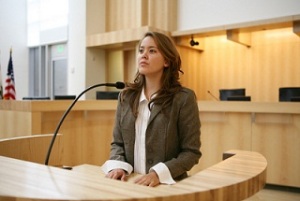A few weeks ago, I reported on a verdict we got against State Farm in Baltimore County. I inadvertently stumbled on the Maryland Daily Record article on the case today.
Abolish Motions for Summary Judgment?
George Washington Law Review has published an article titled, appropriately, Against Summary Judgment. The premise of the article is that summary judgment is an archaic procedural device that usurps the role of the jury.
Nonsense. Summary judgment resolves cases that juries should not have to decide because the law bars the claim… or the defense.
I find annoying this premise of the article: summary judgment is bad because most cases that now go to summary judgment would settle early rather than go to trial. Cases that should fail because they have not stated a claim under the law will still settle because the defendant will want to avoid the risks and costs of litigation.
Titans Lawsuit Against USC
The Tennessee Titans have sued the University of Southern California and coach Lane Kiffin for “maliciously” luring away assistant running backs coach Kennedy Pola. The lawsuit claims the hire disrupted planning and “potential loss of confidence by players.”
The first complex legal question here is clear: do you really need an assistant running back coach? Wait, that’s not a legal question. Okay, how was it “malicious”? Was the purpose of the hire to destroy the Titans by hiring their assistant running back coach? What if they had gone after their head running back coach? Can you imagine the inhumanity?
Look, we all get it. Lane Kiffin is doing a lot of things to damage his reputation. But what kind of message do you send when you sue – against a university – for hiring a coach when the actual thing you are mad about is that Kiffin did not “ask” for permission to hire the coach?
Chain Reaction Car Accident
I spent a good portion of last week preparing for a trial scheduled for today that settled on Friday. It is a little depressing how many many hours our firm spends every year preparing cases for trial that settle. But every time you really prepare for a trial, you learn and, sometimes relearn law and strategies that help you down the road.
The trial was an auto accident case pending in Prince George’s County. The evidence in the case would show a classic chain-reaction car accident: Vehicle #2 rear-ends Vehicle #1 and Vehicle #3 hits Vehicle #2 which hits Vehicle #1. Plaintiff felt two impacts that could only happen under this pattern.
Plaintiff’s treating orthopedic surgeon would testify that the injury is related to the accident. The problem—which caused me a momentary freakout—was that the doctor could not parse which accident caused the injury. How could the doctor possibly know which accident caused the injury?
Maryland Law on Chain Reactions Accidents
First, what is a chain reaction? The definition of a train reaction as we use it is a crash in which three or more vehicles hit one another because of an initial act of negligence.
One big question is who can you sue in a chain reaction accident? We have joint and several liability in Maryland and there can be over one proximate cause of an accident. But my fear was that because the first impact was more significant than the second this would highlight to the court that Vehicle #3 may not have been a significant contributor to the Plaintiff’s injuries. So, the driver of Vehicle #3’s lawyer Erie Insurance) could argue that there is no evidence that his negligence caused the injury. Then, Vehicle #2’s lawyer (also, ironically, Erie) would argue, you know, that same logic applies to us. Even if our drivers are negligent, the joint argument goes, how is this different from a drunk in a bar throwing a punch that never lands? Negligence in the air is not negligence.
I couldn’t put my hands on it right away, but I was confident there was Maryland law that would save me from this argument. See Thodos v. Bland, 542 A.2d 1307, 75 Md.App. 700 (Md. App., 1987) and, even better, Consumer Protection Division v. Morgan, 387 Md. 125 (2005). But even with that law, I was struggling with the rationale. I wanted a source more reliable than my argument of “it would be even more unfair if the plaintiff could not recover in such a case.” Continue reading
Feedburner
If you are a regular Maryland Injury Law Center reader, I want to keep you. I’ve read so many good blogs that I stopped reading because I just kinda forgot about them.
This is one more way to subscribe.
Permissive Use of an Automobile
When an insurance company gets a claim, the first thing it does is look for ways to deny the claim before getting to the merits. I don’t say this derisively. This is how the game is played.
One insanely overused method of avoiding getting to the merits of a case is claiming the defendant driver was not a permissive user. Insurance companies often take remarkably strained views of what is required to allow permission for another to use the owner’s vehicle.
This morning, in Agency Insurance v. State Farm, a wrongful death car accident claim, the Maryland Court of Special Appeals gave Maryland insurance companies a bit more ammo for this defense. The opinion was written by Judge Irma S. Raker, one of the more conservative judges on the Maryland Court of Appeals who is now retired and was specially assigned to the CSA. The case involved two passengers who were killed in an accident in Frederick County. The battle between these insurance companies was over permissive use. The court found that the vehicle owner’s daughter, a senior in high school who was killed in the accident, did not have permission to give permission to her boyfriend to use the vehicle.
But here’s the thing: the boyfriend had used the vehicle before with the owner’s permission. The only argument State Farm had was that there was no specific permission in this case. The only person who could have rebutted that testimony would have been the owner’s daughter who was killed.
I believe the court slices too thinly over whether the daughter’s boyfriend had permission to drive her mom’s car. Because there are too many variables at play. When she allowed the boy to drive the car before, was it made into an enormous deal, or was it a “sure, of course” type response? Assuming there was not a fatal accident, how mad would she have been if she had learned that the boy was driving the car? There should be a bright-line rule to avoid this Serbonian bog and it should err in favor of coverage. Continue reading
State Farm Verdict
Good news for plaintiffs to start off the week. Rod Gaston, a lawyer in our office, tried a Reflex sympathetic dystrophy (RSD) case in Baltimore County last week against a State Farm insured. The offer in the case was $37,000. After hearing evidence for three days, the jury returned after an hour with a $663,821.15 verdict.
against a State Farm insured. The offer in the case was $37,000. After hearing evidence for three days, the jury returned after an hour with a $663,821.15 verdict.
Here’s another good State Farm verdict in 2013: 35 times State Farm’s settlement offer.
Cross Examining Insurance Company’s Medical Expert
Our firm has spent a lot of time, effort and energy trying to get an honest answer that defense experts sedulously avoid: how much do you make testifying in accident cases and how much have you made from this law firm/insurance company?
I think we have fought this issue as hard as anyone in Maryland, recently getting a helpful Maryland Court of Appeals opinion that makes more clear what Maryland law is on the expert’s obligation to produce financial records.
I know a lot of insurance defense attorneys in Maryland think we do this to harass their experts. I get why they think this. There is too much gamesmanship in Maryland accident cases between plaintiffs’ accident lawyers and the insurance companies. Both sides are guilty of this. But with this expert issue, jurors care more about bias than they do the doctor’s pedigree. We care about this issue so much because we think it makes a difference to jurors.
Two Frivolous Lawsuits
A lot of meritorious lawsuits were filed last week. Yet this morning my Google Reader quickly pointed me to two that seem to embody the definition of a frivolous lawsuit:
- Walter Olson on Overlawyered reports on a lawsuit in Canada where the Plaintiff is suing after she jumped out of a car while intoxicated. As I wrote a comment on the Overlawyered post, I cannot imagine a scenario where this is a legitimate claim. I’m all in favor of lawsuits when the victims are innocent.
Requests for Admission Thoughts
I spend a lot of time responding to random questions from other lawyers. I will publish some responses to the extent they are helpful to anyone else. The topic for today is the practical ramifications of requests for admission deemed to be admitted at trial. I will think of others to post.
Reader’s Question: The federal and many Civ Pro rules deem admissions admitted if not responded to within 30 days. Here is the scenario: the court rules the party was dilatory in responding and the admissions are deemed admitted. However, the party did respond to ROGS in time, as you expect
some of the answers are clearly incompatible with deemed admitted admissions. Trial time — if your read into the record the answer to the admitted admission doesn’t the witness have the right to respond no that’s incorrect these admissions were deemed admitted by the court they do not reflect the facts accurately, or no that’s incorrect as I stated in my ROG answers the correct answer is . . . . or will the court not allow the witness to rebut the admitted admission even though a fact finder would see that the admitted admission is actually factually wrong (i.e. admission states that on the day the car you were driving was white however one that day you were driving your own car which was blue but the admission deemed admitted would “force” you to accede to it being white)?? Would the admitted admission be treated akin to a comment made during a depo and can be used during trial to question the veracity of the witness?
Fundamentally I’m wondering about the awkward reality of admissions deemed entered by failing to timely file a response and the fact that the deemed admissions are factually incorrect — would a court countenance allowing a case to be won or lost based on the dubious truth of admissions deemed admitted simply because the rules require the admission to be admitted.





